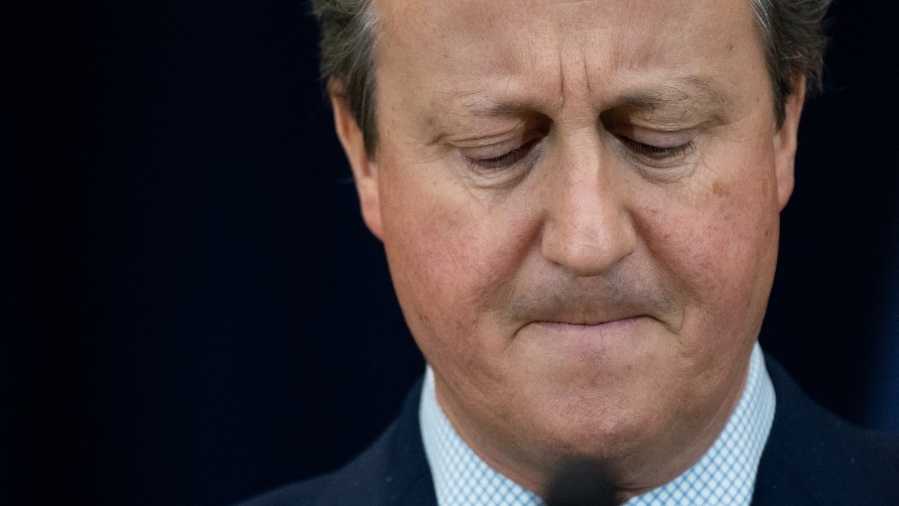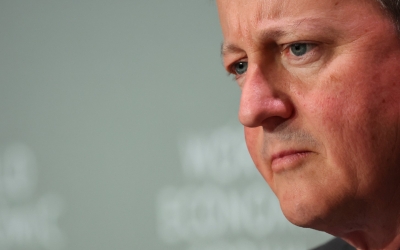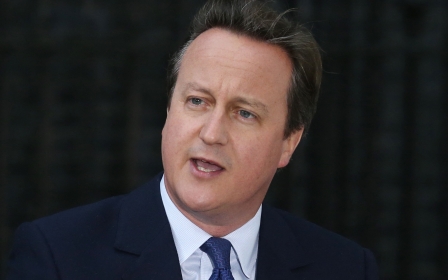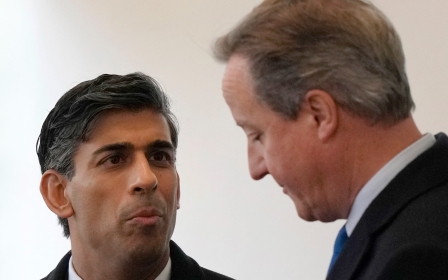War on Gaza: David Cameron must end arms sales to Israel now

When David Cameron was recalled as UK foreign secretary late last year, it was widely seen as a stroke of good fortune for a discredited politician whose reputation had been damaged by Brexit before being ruined by his role in the Greensill lobbying scandal.
Here was an opportunity for the former prime minister to rebuild a reputation as a serious international statesman. And, to be fair, in his early days in the new job, Cameron brought a swagger and sense of purpose that had eluded his predecessor, James Cleverly.
Today, Cameron’s dream job has turned into a nightmare.
He is still remembered as the incompetent prime minister who set in motion the Brexit debacle, and after leaving office, was dragged into the gutter by Lex Greensill.
But now something darker, far less easy to overlook, and utterly impossible to forgive is on his record.
New MEE newsletter: Jerusalem Dispatch
Sign up to get the latest insights and analysis on Israel-Palestine, alongside Turkey Unpacked and other MEE newsletters
Cameron now faces the very real prospect of going down in history as the British foreign secretary who gave the green light to Israeli genocide in Gaza.
In four months, Cameron has made four fundamental decisions, each of which has defined his period as foreign secretary. They were all politically convenient, drew applause among his Conservative supporters, went down well in Israel, and were more than welcome in Prime Minister Rishi Sunak’s Downing Street.
But each of these decisions was morally derelict. They have inflicted massive damage on the country’s international reputation, and above all sent Israeli Prime Minister Benjamin Netanyahu’s far-right government the message that Britain supports its murderous policy in Gaza.
Suspending aid
The first was Cameron’s early mockery of the South African case before the International Court of Justice (ICJ) that Israel was committing genocide in Gaza, which he called “wrong” and “unhelpful”.
Britain is a signatory of the ICJ, loudly celebrates its values, and has a duty to pay the court respect. The arguments marshalled by South Africa were formidable.
Follow Middle East Eye's live coverage of the Israel-Palestine war
Cameron’s second fateful move was his refusal to accept the ICJ ruling when it came down, opting instead to chastise the court for making a decision he disliked.
His third bad call came in the immediate aftermath of the ICJ ruling. With almost incredible naivety, he ordered the suspension of British donor aid to the United Nations agency for Palestinian refugees on the basis of a flimsy, unevidenced dossier circulated by Israel suggesting that Unrwa employees played a role in the atrocities of 7 October.
Cameron is at the heart of these decisions. If and when he stops arms sales, he will have to explain why he didn't act sooner - much sooner
Cameron appears to have made his decision to halt aid to Unrwa, the primary organisation with the ability to alleviate the suffering of starving Palestinians, based on allegations made by an interested party, the truth of which he had no way of judging. It is disgraceful that he has not reversed it, as other countries have.
I now turn to Cameron’s fourth and worst failure of judgment. This concerns British arms sales to Israel, which he could and should have halted months ago.
This week, coordinated by Labour MP Zarah Sultana, more than 130 parliamentarians sent a letter to Cameron and Business Secretary Kemi Badenoch, demanding an immediate end to this ugly and complicit trade.
The signatories, which eye-catchingly include Britain’s former ambassador to the US, John Kerr, note that “business as usual” with regards to arms exports to Israel is “totally unacceptable”.
Pressure to act
The letter makes two crucial points. Firstly, it notes that an F-16 fighter jet, made with British parts, likely bombed British doctors at a compound in Gaza. UK arms are being used in Gaza, including against our own citizens.
Secondly, it points out that in two previous conflicts, Britain did suspend arms sales to Israel. “Today, the scale of violence committed by the Israeli military is vastly more deadly, but the UK government has failed to act,” the letter states.
The timing of the letter is especially telling, coming after Netanyahu rejected the UN Security Council’s demand for a ceasefire. It also follows Canada’s decision to halt future arms sales to Israel.
The Canadian decision is especially worrying for Cameron because Ottawa’s regime for approving arms export permits is so similar to Britain’s. Canadian law prohibits the export of weapons that could be used in “a serious violation of international humanitarian law” or “serious acts of violence against women and children”.
The foreign secretary thus faces huge pressure to act now. The mystery is that he has not done so already.
There’s been no shortage of evidence of Israeli atrocities ever since he became foreign secretary last November. Cameron will be keenly aware of this evidence. The UK’s own criteria stipulate that weapons must not be exported if there is a clear risk they may be used to violate international law.
As foreign secretary, Cameron is at the heart of these decisions. If and when he stops arms sales, he will have to explain why he didn’t act sooner - much sooner.
I have known Cameron for three decades, and always liked him. He carries an air of cheerful, though weightless, charm and optimism. But nothing in his career has prepared him for this genocidal horror in Gaza. Not his education at Eton and Oxford, his early years as a rising star at Conservative Central Office, nor his circle of affluent and fashionable home-counties friends.
Cameron instinctively likes and trusts people. In many ways, that’s an admirable fault. But it helps explain, I think, why the British foreign secretary trusted Netanyahu, leader of the most extreme and far-right government in Israeli history. What a terrible mistake.
The views expressed in this article belong to the author and do not necessarily reflect the editorial policy of Middle East Eye.
Middle East Eye delivers independent and unrivalled coverage and analysis of the Middle East, North Africa and beyond. To learn more about republishing this content and the associated fees, please fill out this form. More about MEE can be found here.






